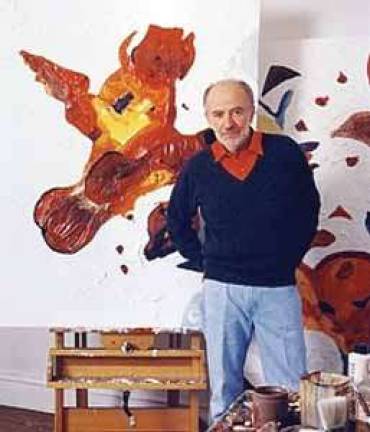Tribute to Marvin Gutin, Restaurant Impresario and Impressionist Artist

West Siders remember owner of Marvin's Garden By Amanda Woods When Marvin Gutin's family and friends think of him, they remember a man who got to know everyone, always listened, cracked jokes often and helped anyone who needed it. Gutin, 85, who passed away on Wednesday due to lung cancer, had lived on West End Avenue and 85th Street with his wife, Sukey, since 1979. Sukey Gutin fondly remembered the first time she spoke with him. She was visiting a neighbor on the sixth floor of her apartment building when Gutin arrived, and the two instantly clicked. "At dessert and coffee time, in comes this man, and we seemed to laugh together and laugh for the rest of the time," she said. Gutin was known for his humor, but he was also known for much more, his family members and friends said. "Dad was a man of many faces," said Charles Gutin, his son. Gutin was an established, friendly presence on the Upper West Side. He owned Marvin Gardens at 82nd Street and Broadway, a popular restaurant that became a community hangout from 1974 until its closure in 1992. There, he met Upper West Siders from all walks of life. "Famous people sat down next to out-of-work actors," said Tony Vlachos, one of Gutin's best friends. Marvin Gardens was just the kind of restaurant the Upper West Side needed, said Erica Bunin, Gutin's niece. At a time when racial tension was still strong in the nation, Gutin welcomed everyone into his restaurant, regardless of their background. "He gave everyone a big hug and he employed people who might not have had a chance," said Council Member Gale Brewer, who knew Gutin well. He was also a great listener, recalled actor and comedian Jerry Stiller, who often visited Marvin Gardens. He and his wife, Anne Meara, grew close to Gutin, and they often invited him and his wife over for holiday parties and Seders. "He was there for you to let out some of the stuff that you would normally lay out on a psychiatrist's couch," Stiller said. "He was like a Jewish Mark Twain: He would talk about anything." Gutin wasn't the stereotypical restaurant owner-he wasn't greedy and he lent money to those who needed it, Stiller added. "A man came in who couldn't pay and the waiter didn't know what to do. He went to my father and my father said 'forget about it' and ripped the check up," Gutin's daughter, Julia Gutin-Hamilton, said. "I still remember that, because he showed compassion instead of getting outraged." Outside of running the restaurant, Gutin was passionate about painting. He called himself an "existential expressionist." "I start a painting without preconceptions," Gutin wrote on his website. "Music connects me to my emotions, and the resulting colors and forms create an inner emotional landscape. Ultimately, the meanings and symbols in my work may be as obscure to me as they are to the viewer. Each person must rely on his own experience when viewing the work as no two realities are the same." When Gutin sat in front of a blank canvas, he didn't know what he was going to paint, his family members shared ? but when he listened to music, inspiration kicked in. Gutin enjoyed traveling ? and he once sold hot dogs out of a cart in Spain, his son Charles remembered. Despite Gutin's love for travel, he considered the Upper West Side his home. He and Sukey, recognizing the neighborhood's rich past and diverse population, advocated for turning West End Avenue into a historic district. "He was a true New York West Sider," Anne Meara said. He often took notice of the people who passed him on the city streets. "We would walk up the street and he would say, 'Look at the couple over there. It looks like they just had a fight,'" Charles said. Friends and family believe Gutin helped shape the neighborhood and make it a better place to live. "There were so many people that he knew," Charles said. "There's a hole in the neighborhood now."